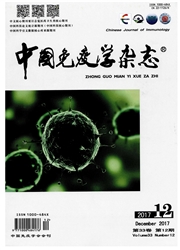

 中文摘要:
中文摘要:
目的:探讨内毒素脂多糖(lipopolysaccharide,LPS)的诱导作用对大鼠雪旺氏细胞肿瘤坏死因子α(tumor nec-rosis factor-α,TNF-α)的表达。方法:不同浓度,不同时间用LPS刺激雪旺氏细胞,用酶联免疫吸附实验(ELISA)分别检测细胞胞液和上清中分泌的TNF-α的表达量,同时用间接免疫荧光细胞化学染色检测TNF-α的细胞定位。结果:用LPS10μg/ml刺激后2小时能显著促进雪旺氏细胞浆内TNF-α的表达,同时也检测到培养液上清中有TNF-α的释放。结论:细菌的致病因子LPS的诱导确能促进雪旺氏细胞高效表达和分泌TNF-α,从而为雪旺氏细胞作为免疫活性细胞在周围神经系统中发挥免疫调节作用提供初步依据。
 英文摘要:
英文摘要:
Objective:To explore the effects of lipopolysaccharide(LPS) on expression of TNF-α in rat Schwann cells. Methods: Schwann cells were treated with LPS at different concentration and for variant duration. TNF-α in cytoplasm and supernatant were quanti- fied by sandwich enzyme-linked immtmosorbent assay(ELISA). Intracellular location of TNF-α was detected under confocal microscope. Results :LPS could predominantly induce TNF-α expression in cytoplasm of rat Schwann cells, and after 10 μg/ml for 2 h,TNF-α was de- tected in the cultural supernatant. Indirect-immcnoflurescence staining indicated increased expression of TNF-α following LPS induction. Conclusion:Bacterial causative agent-LPS could induce the expression and secretion of TNF-α in rat Schwann cells, which imply that Schwann cells, as immtmocompetent cells, may play an important role in the immune regulation in the peripheral never system.
 同期刊论文项目
同期刊论文项目
 同项目期刊论文
同项目期刊论文
 JNK-induced MCP-1 production in spinal cord astrocytes contributes to central sensitization and neur
JNK-induced MCP-1 production in spinal cord astrocytes contributes to central sensitization and neur c-Fos and pERK, which is a better marker for neuronal activation and central sensitization after nox
c-Fos and pERK, which is a better marker for neuronal activation and central sensitization after nox Central serotonergic neurons are differentially required for opioid analgesia but not for morphine t
Central serotonergic neurons are differentially required for opioid analgesia but not for morphine t Altered beta-1,4-galactosyltransferase I expression during early inflammation after spinal cord cont
Altered beta-1,4-galactosyltransferase I expression during early inflammation after spinal cord cont Elevated beta 1,4-galactosyltransferase-I induced by the intraspinal injection of lipopolysaccharide
Elevated beta 1,4-galactosyltransferase-I induced by the intraspinal injection of lipopolysaccharide SSeCKS promote beta-amyloid-induced PC12 cells neurotoxicity by up-regulating tau phosphorylation in
SSeCKS promote beta-amyloid-induced PC12 cells neurotoxicity by up-regulating tau phosphorylation in Cyclin D3/CDK11(p58) Complex Involved in Schwann Cells Proliferation Repression Caused by Lipopolysa
Cyclin D3/CDK11(p58) Complex Involved in Schwann Cells Proliferation Repression Caused by Lipopolysa A Critical Role of Src-Suppressed C Kinase Substrate in Rat Astrocytes After Chronic Constriction In
A Critical Role of Src-Suppressed C Kinase Substrate in Rat Astrocytes After Chronic Constriction In Lipopolysaccharide-evoked HSPA12B expression by activation of MAPK cascade in microglial cells of th
Lipopolysaccharide-evoked HSPA12B expression by activation of MAPK cascade in microglial cells of th The expression patterns of beta 1,4 galactosyltransferase I and V mRNAs, and Gal beta 1-4GlcNAc grou
The expression patterns of beta 1,4 galactosyltransferase I and V mRNAs, and Gal beta 1-4GlcNAc grou 期刊信息
期刊信息
